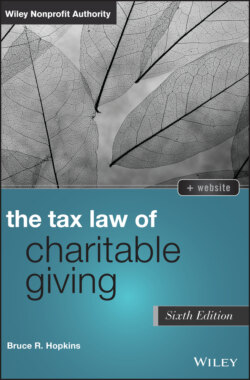Читать книгу The Tax Law of Charitable Giving - Bruce Hopkins R., Bruce R. Hopkins, David Middlebrook - Страница 28
(d) Incidental Benefits
ОглавлениеWhen a benefit to a donor is incidental, the benefit will not defeat the charitable deduction. The following are instances of application of that rule.
A tornado destroyed several homes in a town. The local chapter of the American National Red Cross provided food and temporary shelter to an individual whose home was destroyed. The individual, motivated by gratitude, made a (deductible) contribution to the chapter. 143
An individual owned a home in an area served by a volunteer fire department. Neither state nor local taxes were used to support the fire department. The individual made a (deductible) contribution to the volunteer department's annual fund drive.144
An individual's daughter was a member of a local unit of the Girl Scouts of America. The individual made a (deductible) contribution to the Girl Scouts of America.145
Merchants and owners of property in a city made (deductible) contributions to the city to enable it to provide railroad companies with new facilities outside the city, in exchange for the railroads' removal of their inner-city facilities and relinquishment of their right of way through the city (even though the merchants and property owners received some benefit from removal of the railroad facilities).146
An organization made (deductible) contributions to a police department to assist the department, as a regular part of its operations, in offering rewards for information leading to the apprehension and conviction of persons engaging in criminal activity within the community in which the organization was located.147
A parent of a murdered individual made a (deductible) contribution of reward money to the police department of a political subdivision for information leading to the conviction of the murderer, with some or all of the money available for public purposes if not needed to pay the reward.148
An individual made a (deductible) contribution of a tract of land to the federal government and retained the right during his lifetime to train his hunting dog on the trails extending over the tract.149
A developer of a residential community made a (deductible) contribution of real estate, tangible personal property, and cash to a state to assist in the construction of a highway (even though the highway would benefit the planned community).150
An individual made a (deductible) contribution of a tract of land and a house to an educational organization for a conference and retreat center. The contribution was deductible even though the donor retained an adjoining lot for personal use and a nonexclusive easement for pedestrian and vehicular ingress and egress over the existing driveway on the contributed lot.151
A member of a federal advisory committee, who incurs unreimbursed travel and other out-of-pocket expenses while performing services without compensation as a member of that committee, is entitled to a charitable deduction for the expenses as long as the requirements for the deduction are satisfied (“other than those relating to the expectation of any benefit or financial return”).152
When a private foundation153 is a charitable donee and the donor is a disqualified person154 with respect to the foundation, care must be exercised that the contribution is not an act of self-dealing.155 An act of self-dealing can be caused if the making of a gift bestows a benefit of some consequence on the disqualified person/donor. When the benefit is merely “incidental and tenuous,” however, an act of self-dealing will not result.156
The application of rationales other than the quid pro quo test in relatively recent years is somewhat surprising, in that Congress, speaking by means of legislative history in 1954, wrote that gifts are “contributions which are made with no expectation of a financial return commensurate with the amount of the gift.”157 Thus, it would seem that the quid pro quo test should, unquestionably, be the law.
